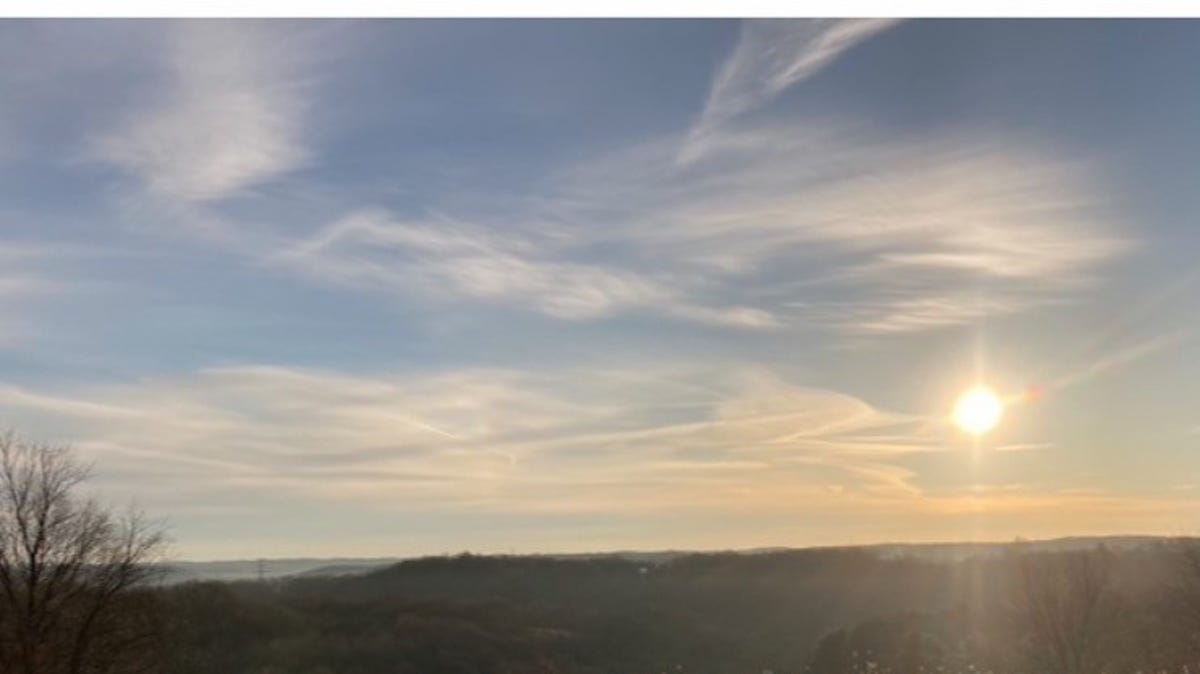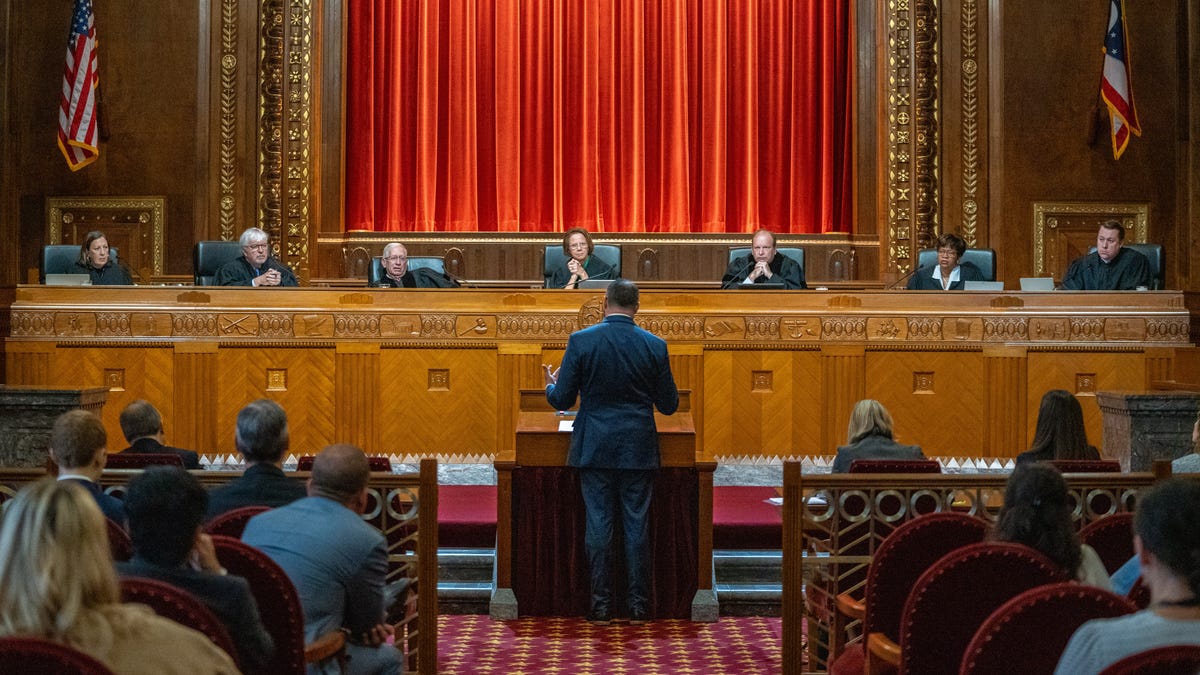Ohio
Browns' draft picks from Michigan, Ohio State connected by horrific injury in last year's big game

BEREA, Ohio — The Cleveland Browns selected two players in the NFL draft forever connected by a horrific injury.
In Friday’s third round, the team picked Michigan guard Zak Zinter, who broke his left leg against Ohio State on Nov. 25 when Buckeyes defensive tackle Michael Hall Jr., taken by the Browns in the second round, was accidentally thrown into him.
Zinter, an AP first-team All-American, fractured his tibia and fibula on a play that hushed a crowd of more than 100,000 fans inside Michigan Stadium.
Former rivals, Zinter and Hall are now teammates — already linked by a fateful play.
“Kind of a full-circle moment,” Zinter said on a conference call.
The 6-foot-6, 309-pound Zinter was blocking another Ohio State lineman when Hall was pushed down onto the back of Zinter’s leg. As he lay on the field in pain, Michigan’s team left its sideline to support him and the crowd broke into chants of “Let’s Go Zak!” before Zinter was carted off.
The moment inspired the Wolverines, who scored on the next play, beat Ohio State for the third year in a row and went on to win the school’s first outright national championship since 1948.
Zinter said he has no hard feelings toward Hall. They’ve only talked once while making a team visit together.
“He is a great dude and it’s football stuff that happens when we’re playing in the trenches,” Zinter said. “But I’m fired up and I think everything happens for a reason. Now we’re going to be teammates, so I’m fired up to get there and get to work with him at practice.”
Zinter said his leg has healed nicely, and he feels fortunate he can pursue his dream of playing.
“I’ve been saying all along that this is the best worst-case scenario,” he said. “I mean, it’s just bone. Bone heals easy, way better than ligaments in the knee or the ankle.”
The Browns aren’t worried about Zinter having any lingering effects from the injury.
“We didn’t do a private (workout) or anything like that, but we felt really good about the medical,” general manager Andrew Berry said. “They did send video of him moving around on his own in private workouts, but he’ll be ready to go this spring and there’s really no concern about the leg.”
While it was thrilling to see his teammates finish off an unbeaten season, Zinter said it was difficult not being on the field.
“I decided to come back for my senior year last year to come back with the guys and compete and win a national championship and to go down in my senior night, last game in the Big House against Ohio State, all that kind of stuff,” he said. “It’s definitely bittersweet, but the boys rallied around me and we came out on top.”

Ohio
East Palestine derailment damaged my farm, open my eyes. Ohio needs solar programs

White House unveils $7B in solar grants
The White House has announced $7 billion in solar power grants, but it comes as some states are experiencing a surplus of this energy.
Straight Arrow News
Steve Mondak is an Ohio family farmer and youth facilitator at the Mahoning and Columbiana Training Association.
When a freight train derailed last year, spilling hazardous materials into the atmosphere, it damaged my farm, and it opened my mind.
As an Ohio farmer, I have always been a conservationist. But the environmental devastation from an incident that took place five miles from my farm taught me the importance of taking better care of our planet — and made me appreciate the value of clean energy.
That’s why I support House Bill 197. Sponsored by James Hoops, R-Napoleon, and Sharon Ray, R-Wadsworth, HB 197 is a bipartisan legislative proposal to establish a pilot program for community solar. It would benefit family farmers like me and represent a meaningful step toward a healthier environment.
My family resides on a 101-acre general use farm near East Palestine. We maximize yield on timber and firewood, we have hayfields for livestock feed production, and we keep a flock of chickens for eggs.
I used to maintain an apiary to produce honey, beeswax and propolis, but after the derailment in February of 2023, my bees were killed off and I can no longer sell honey.
Property values have plummeted, and we worry about the potential health effects that we may suffer as a result of the disaster. There is no data to predict the long-term human effects of a catastrophe of this magnitude as a result of drinking the well water or breathing the air.
So, while we monitor our own health, I want to play a part in creating a healthier environment.
I am reminded of a family trip taken down Route 23 through the coalfields of eastern Kentucky several years ago. We stopped the truck on top of a mountain road. I was shocked to see that from horizon to horizon was an absolute wasteland, devoid of even a blade of grass. It looked like a nuclear bomb had been dropped, when in fact, it was just the result of mountaintop removal coal mining.
When I recall that, and when I think about what happened in my own community, finding a cleaner form of energy production just makes good sense.
A bit larger than the solar systems you put on your roof, and a lot smaller than the giant industrial solar farms many utilities are contracting with, community solar facilities are local, and bring lots of local benefits as well.
These solar projects are shared by multiple community subscribers who receive credit on their electricity bills for their share of the renewable power produced. The business model builds a more resilient electric grid and expands access to energy choice for all, including low-to-moderate-income customers and those who don’t have the means or the freedom to place panels on their homes or businesses.
As a rural landowner, I canhost a community solar farm, and if the General Assembly passes HB 197, I would be encouraged to do so.
Other farmers will, too. It can be a struggle to make ends meet on a small family farm when seed and fertilizer need to be purchased and when equipment needs to be repaired or replaced. By hosting a community solar farm, Ohio farmers can secure new sources of income to ensure their continued vitality while providing much-needed relief to our rural economy.
Community solar doesn’t just offer a financial opportunity to harvest a new solar crop. It will also bring exciting and rewarding jobs, economic development and new tax revenue to my small rural community.
HB 197 supports energy independence by encouraging the development of new homegrown energy sources for Ohioans. It would create a pilot project offering subscribers help and support to obtain benefits from new renewable, less expensive energy sources. It would also enable Ohio businesses to access the benefits of renewable energy generated in Ohio, instead of leaving them to purchase energy from neighboring states.
As my community deals with the aftermath of the train derailment, environmental protection has taken on a new meaning. If Ohio can empower consumers with the choice for low-cost energy from nonpolluting solar farms, why wouldn’t we?
Steve Mondak is an Ohio family farmer and youth facilitator at the Mahoning and Columbiana Training Association.
Ohio
Two rulings against open records. Is Ohio Supreme Court shifting away from transparency?

Body cam footage: Blendon Township releases Ta’Kiya Young police shooting video
Blendon Township has released body camera footage Friday morning from the fatal shooting of 21-year-old Ta’Kiya Young. The footage is from both of the body cameras of the officers who were involved in the shooting, which happened around 6:20 p.m. Aug. 24 in the parking lot of the Kroger.
Blendon Township Police Department, The Columbus Dispatch
In a matter of four months, the Ohio Supreme Court ruled against releasing information in two public records cases, and it is now weighing what to do two other high-profile records fights.
In a 4-3 decision issued in January, the court held that the cost of sending troopers to protect the governor at a Super Bowl game weren’t subject to disclosure. And in a 5-2 ruling in April, the court said that the Ohio Department of Health should redact from a database the names and addresses of Ohioans who had died, even though that death certificate information is released on a one-by-one basis.
Both of those lawsuits were filed by the owners of this newspaper.
Pending before the court now are two cases about whether police officers’ names can be withheld under a new law that is supposed to protect crime victims.
Cleveland area attorney Brian Bardwell, a former journalist who operates Speech Law LLC, said the two recent rulings are evidence of a long-running hostility toward open records from the Ohio Supreme Court.
“When it comes to government accountability, civil rights, public records, the solutions for the courts is always to just close the doors tighter and tighter and keep people out. They just want people to stop filing these cases and go away,” Bardwell said. “What they really need to do is start doling out harsher and harsher punishment to mayors and public police officers and other government officers who want to operate behind closed doors.”
But Columbus attorney Fred Gittes, who has been litigating open government cases for nearly five decades, said it’s difficult to predict how the supreme court will rule on records cases and the two decisions this year don’t make a pattern.
Ohio’s ‘sunshine’ laws
Ohio has “sunshine” laws designed to hold governments accountable and help the public know what their governments are doing.
The open records law lays out what records − budgets, meeting minutes, personnel files, police reports and more − must be disclosed upon request. The open meetings act requires public bodies to hold their meetings in the open.
Both laws have exceptions. For example, public bodies can meet behind closed doors to discuss pending litigation or the purchase of property. The open records law allows withholding records related to trial preparation, juveniles, public employees’ home addresses and other matters.
Should police officers’ names be disclosed?
The Ohio Supreme Court is considering other public records cases that could have sweeping implications for open government. Two cases involve how to interpret Marsy’s Law, a voter-approved constitutional amendment that is supposed to protect and support crime victims.
Police agencies across Ohio have used Marsy’s Law as grounds for not disclosing names of officers involved in fatal shootings and use of force. In cases where officers have been assaulted or injured in those incidents, they’re categorized as crime victims.
Nadine Young asked the Ohio Supreme Court to order the Blendon Twp. Police Department to disclose the names of the two officers involved in fatally shooting her daughter, Ta’Kiya Young, in a Kroger parking lot in August 2023. The police department argued that Young assaulted officers with her car, making them the victims.
The Young family and the Ohio Crime Victims Justice Center sued over the redactions, saying Ta’Kiya Young was the crime victim, not the officers. The Ohio Supreme Court ordered the police department to identify the officers to the court but has yet to rule on the overall case.
The Columbus Dispatch filed a similar lawsuit in October 2023 against Columbus police for failing to disclose names of officers involved in fatal shootings and use of force.
Police and the Franklin County Sheriff’s Office declined to release footage or names after four officers and a deputy were involved in a July 2023 shooting that left 45-year-old Antwan Lindsey dead.
After three young boys were shot and killed at their home in Clermont County in June 2023, the sheriff’s office cited Marsy’s Law and redacted documents containing the officers’ narratives of the incident.
Cincinnati police have been withholding the names of homicide victims and redacting their names from incident reports for months, citing Marsy’s Law.
And the Akron Beacon Journal is suing the city of Akron to force disclosure of the identities of officers involved in three separate fatal shootings. That case, filed in 2022, does not involve Marsy’s Law. It is pending before the Ohio Supreme Court.
Gittes said in his opinion, police shouldn’t be allowed to keep their identities secret under Marsy’s Law because officers’ accountability is crucial given their power to arrest and use deadly force.
Without transparency, there is no accountability, he said.
Bardwell isn’t hopeful that the Ohio Supreme Court will rule in favor of transparency in the Marsy’s Law cases and that will give police agencies the go-ahead to hide more records. “If you give the police an inch on secrecy, they’re going to take a mile and I’m betting that’s where we’ll end up here as well.”
Lawmakers probably won’t make changes
State lawmakers could change the state law that describes how Marsy’s Law operates, change the laws that protect health care information from disclosure or make other tweaks to increase transparency.
“I won’t be holding my breath on it,” Bardwell said.
Gittes agreed and said lawmakers are more likely to add more exemptions to the open records law.
“Over the last few decades, the Legislature has been increasingly hostile to open government, records in particular,” he said.
Laura Bischoff is a reporter for the USA TODAY Network Ohio Bureau, which serves the Columbus Dispatch, Cincinnati Enquirer, Akron Beacon Journal and 18 other affiliated news organizations across Ohio.
Ohio
Ohio Senate votes to put Biden on 2024 ballot, but problem isn’t fixed yet
Senate Republicans voted to put President Joe Biden on the ballot, but only after pairing it with campaign finance legislation opposed by Democrats
Here’s what we know now about election polling in 2024
In the 2016 presidential election, pollsters infamously predicted that Hillary Clinton would win the White House. Here’s what we know now about election polling in 2024.
The Ohio Senate voted Wednesday to put President Joe Biden on the November ballot, but only after pairing it with campaign finance legislation that Democrats cast as a poison pill and refused to support.
Senate Republicans approved a one-time ballot fix that would change the certification deadline to 74 days before the Nov. 5 election. Under current law, state officials must certify the ballot by Aug. 7 − 90 days beforehand − but Biden won’t be nominated until the Democratic National Convention 12 days later.
The Senate vote came one day after House leaders unveiled a separate plan to get Biden on the ballot and prevent future scheduling conflicts. The House is expected to take up that bill this afternoon.
Republicans folded the new deadline into a bill that would allow candidates to use their campaign funds to cover child care costs. It also includes a modified plan to ban foreign citizens and U.S. residents with green cards from donating to ballot campaigns. It’s already illegal for non-U.S. citizens to donate to candidates.
Senate Democrats opposed the bill − despite the fix for Biden − and said it would create another hurdle for groups that want to place issues on the ballot. For instance, it would require those campaigns to register as political action committees, something critics say could burden hyperlocal efforts like liquor options.
Republicans proposed the changes after a progressive dark money group poured millions into campaigns for the abortion rights amendment and independent redistricting commission.
“This Legislature is not fair,” Sen. Bill Demora, D-Columbus, said. “It’s not bipartisan. It’s not how policy should be made.”
Which Biden ballot fix will the Ohio House support?
It’s unclear what happens from here.
The Ohio House will vote on a different bill Wednesday that would change this year’s deadline to 74 days before the election. For 2028 and beyond, it would allow parties that can’t meet the 90-day deadline to certify presidential candidates either 74 days beforehand or within three days of their convention, whichever comes first.
Ohio has one of the earliest ballot deadlines in the country, according to the National Association of Secretaries of State. And this isn’t the first time it caused problems: The Legislature voted in 2012 and 2020 to temporarily change the deadline when parties scheduled their conventions too late.
Bills do not take effect for three months after Gov. Mike DeWine signs them, unless they come with an emergency clause attached. Secretary of State Frank LaRose said the Legislature needs to act by Thursday to get a fix in place.
LaRose supports the ban on foreign spending, but his spokesman, Ben Kindel, declined to say if he has a preferred plan for getting Biden on the November ballot.
“We’re leaning on the Legislature to come up with a fix that works for our Ohio law,” Kindel said.
This is a developing story and will be updated.
USA TODAY Network Ohio Bureau reporter Jessie Balmert contributed.
Haley BeMiller is a reporter for the USA TODAY Network Ohio Bureau, which serves the Columbus Dispatch, Cincinnati Enquirer, Akron Beacon Journal and 18 other affiliated news organizations across Ohio.
-

 Politics1 week ago
Politics1 week agoThe White House has a new curator. Donna Hayashi Smith is the first Asian American to hold the post
-

 Politics1 week ago
Politics1 week agoStefanik hits special counsel Jack Smith with ethics complaint, accuses him of election meddling
-

 News1 week ago
News1 week agoVideo: Police Arrest Columbia Protesters Occupying Hamilton Hall
-

 World1 week ago
World1 week agoStrack-Zimmermann blasts von der Leyen's defence policy
-

 Politics1 week ago
Politics1 week agoNewsom, state officials silent on anti-Israel protests at UCLA
-

 News1 week ago
News1 week agoPolice enter UCLA anti-war encampment; Arizona repeals Civil War-era abortion ban
-

 World1 week ago
World1 week agoTurkish police arrest hundreds at Istanbul May Day protests
-

 Politics1 week ago
Politics1 week agoDemocratic mayor joins Kentucky GOP lawmakers to celebrate state funding for Louisville

















